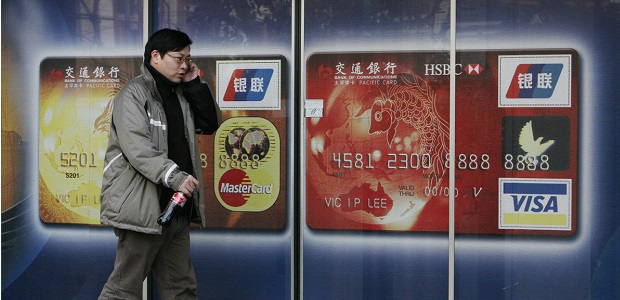
China’s government is finally preparing to put an end to China UnionPay’s monopoly on clearing bank card transactions in a move that could open up a huge market to Visa and MasterCard, according to bloomberg.com. Overseas and Chinese companies can apply to set up such services, the central government’s microblog reported yesterday, citing a State Council meeting headed by Premier Li Keqiang. The statement didn’t give a timeframe or provide additional details.
China’s market opening would represent a “huge opportunity” for U.S. payment networks, according to FBR Capital Markets analyst Scott Valentin. The World Trade Organization told the Asian nation in 2012 to stop discriminating against foreign payment firms, a group that includes American Express Co. (AXP) UnionPay is the sole clearing service provider for yuan-denominated bank-card payments.
“China has always been a carrot out there for the networks, but without more details, people are skeptical,” Valentin said in a phone interview yesterday. “The devil is in the details.”
Visa Chief Executive Officer Charlie Scharf told investors yesterday that he welcomes the announcement.
“We look forward to seeing the specific details and working with the people within China to figure out what we need to do to participate in that marketplace where we believe we can add a lot of value,” Scharf said.
Seth Eisen, a spokesman for Purchase, New York-based MasterCard, echoed that view. The announcement is a “good step in the right direction,” though many details remain unclear, Eisen said in an e-mailed statement. “We will continue to monitor closely and look forward to the day when we can compete for domestic business in China.”
Established in 2002 in Shanghai by the State Council and the central bank, UnionPay has more than 3.8 billion bank cards in circulation. In 2013, bank-card transactions increased 48 percent to 32.2 trillion yuan ($5.3 trillion) in China, according to the company.
A case brought by the U.S. to the WTO and ruled on in July 2012 challenged China’s requirement that foreign card issuers – including Citigroup Inc. (C), which in August 2012 became the first Western bank in China to issue solely branded credit cards – must use UnionPay’s network for yuan-denominated transactions.
Stopping Discrimination
The rules, along with those requiring all Chinese automated teller machines and merchants to use its network, had prompted the WTO to order that China stop discriminating against foreign payment companies.
UnionPay supports and will follow the government’s decision, the company said in a statement yesterday, adding that it will compete “fairly” and under the same rules as new entrants. The company will embrace competition by improving its products and services, according to the e-mailed statement.
UnionPay surpassed MasterCard in 2012 to become the world’s second-biggest payments network by customer spending.
Banking 4.0 – „how was the experience for you”
„To be honest I think that Sinaia, your conference, is much better then Davos.”
Many more interesting quotes in the video below: